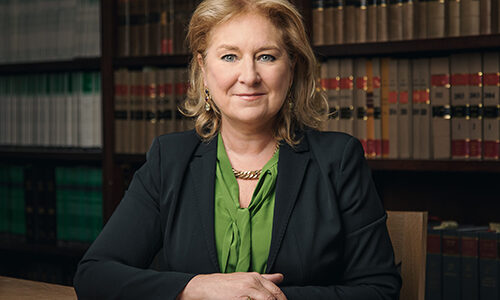Lady Chief Justice

The Lady Chief Justice, The Right Honourable the Baroness Carr of Walton-on-the-Hill, is the Head of the Judiciary of England and Wales and the President of the Courts of England and Wales.
Key responsibilities
The role, which in its modern form dates back to 1873, has some 400 statutory (required by law) duties. Under the Constitutional Reform Act 2005, the Lady Chief Justice’s key responsibilities include:
- Representing the views of the judges and magistrates of England and Wales to Parliament and Government.
- The welfare, training and guidance of the judges and magistrates of England and Wales. The Lady Chief Justice discusses with Government the provision of resources for the judiciary, which are allotted by the Lord Chancellor.
- Deciding the court areas in which individual judges sit and allocating work to the courts in England and Wales.
The LCJ also:
- Is President of the Courts of England and Wales and may hear cases in any English or Welsh court, including in Magistrates’ Courts.
- Sits on important criminal, civil and family cases. The LCJ gives judgments and lays down practice directions (these set out the approach that must be taken to cases in future) in many of the most important appeal cases.
- Shares responsibility with the Lord Chancellor for the Office for Judicial Conduct Investigations Office, the body which investigates complaints made against judicial office holders.
- Is President of the Sentencing Council, the independent body set up to support greater consistency in sentencing.
- Chairs the Judicial Executive Board and the Judges’ Council, two bodies which assist in managing her responsibilities. The LCJ is also President of the Magistrates’ Association.
The LCJ and the senior judiciary are supported by a department of civil servants (independent from Government) who form the Judicial Office.
Appointment
The appointment of the Lord Chief Justice is made by His Majesty The King on the advice of the Prime Minister and the Lord Chancellor following the recommendation of an independent selection panel chaired by Helen Pitcher OBE, Chair of the Judicial Appointments Commission. The other members were Lord Lloyd-Jones of the Supreme Court, Sue Hoyle OBE and Sarah Lee (lay and professional members of the Judicial Appointments Commission), and Lord Justice Edis (Senior Presiding Judge).
This selection exercise was run under the relevant sections of the Constitutional Reform Act 2005 as amended by the Crime and Courts Act 2013. In accordance with section 70 of the Constitutional Reform Act 2005, as amended by the Crime and Courts Act 2013, the panel determined the selection process to be followed and consulted the Lord Chancellor and the First Minister of Wales on the process followed.
In accordance with s.10(3) of the Senior Courts Act 1981 c.54, the selection exercise was open to all applicants who satisfied the judicial-appointment eligibility condition on a 7-year basis, or were judges of the Supreme Court, Court of Appeal, or High Court.
Given the challenges of reducing the outstanding caseloads across jurisdictions and the drive for modernisation across the Courts and Tribunals, candidates were expected to be able to serve for at least 4 years.
